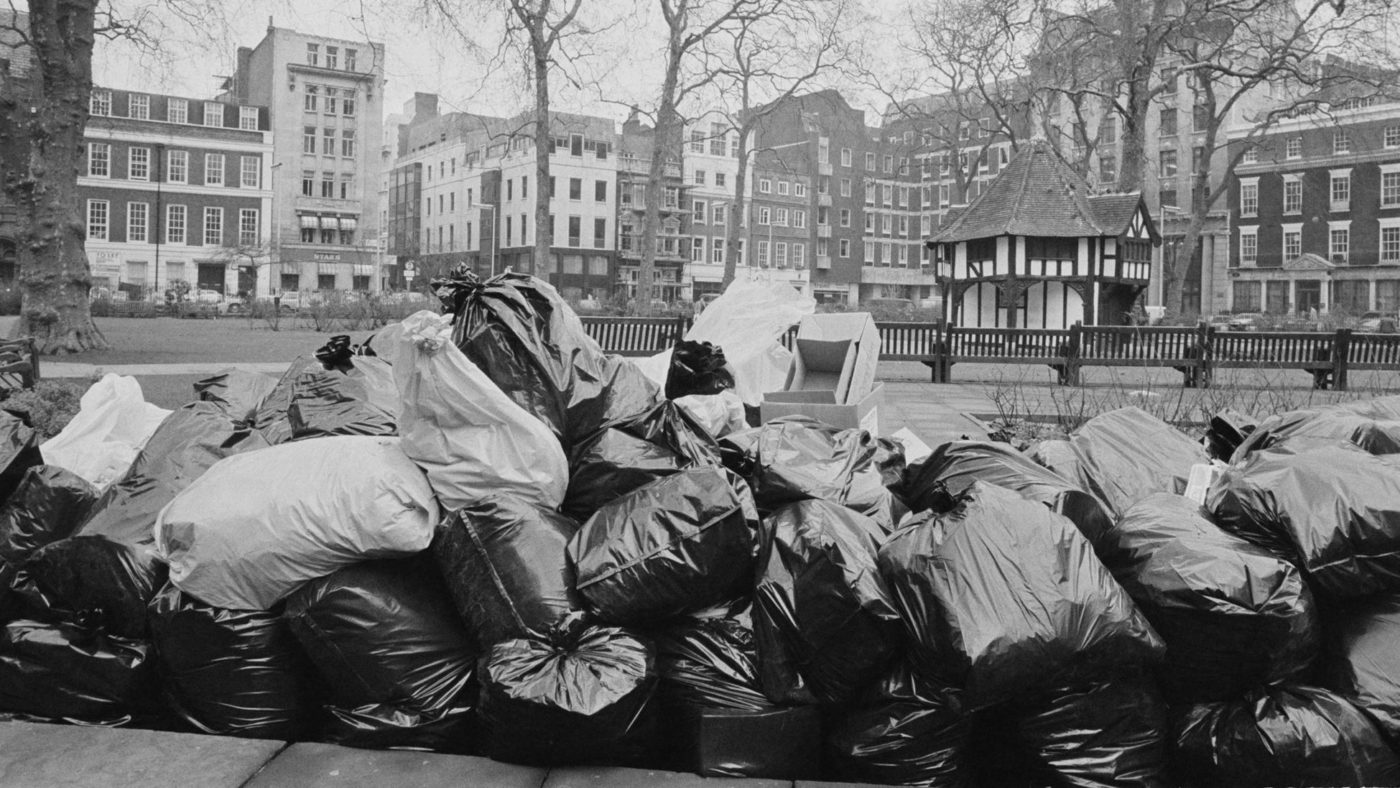Not everyone is old enough to remember the dark days of the 1970s when the public sector unions last had a monopoly grip on the provision of local government services.
The infamous ‘winter of discontent’ in 1979 when bodies were left unburied and streets were blocked by huge piles of garbage is not an experience which we should risk repeating. An ITN report of the time described a visit to Barking where all the schools were closed because of a caretakers’ strike, but, it continued:
“The 27,000 children affected will have to stay at home. There are no parks, libraries or play centres open. The council’s lorry fleet is locked up, and the Meals on Wheels Service is running down as the strike spreads. Many are already relying solely on their neighbours to bring home food. The strike has shut cemeteries as well.”
The inability to bury the dead was one of most shocking aspects of this episode, and the union leaders didn’t give a damn about it. Liverpool City Council considered asking families to “make their own arrangements for grave digging” but did not proceed on the grounds that mourners would not have “the skill or the strength” to dig their loved one’s grave. So instead it stored the dead bodies in a disused factory in Speke – by the end of January 225 unburied corpses were lying there.
These local government strikes were all about the unions using their monopoly control of local services to force the government to award them pay rises. “We’ll tell it to you straight,” said one group of pickets to the Downing Street policy chief, “our purpose is to get more than you offer and whatever you offer it won’t be enough”.
Sadly the Labour Party now appears determined to hand the unions monopoly control of local services once more. Apparently a Corbyn Government would legislate to ensure that the default option was for councils to deliver local services using their own directly employed workforce.
At the beginning of the 1980s a few services such as garbage collection were contracted out to the private sector with great success in terms of cost and reliability. Southend -on-Sea Borough Council was one of the early pioneers, contracting out its street cleaning, refuse collection and public toilet maintenance services and achieving a saving of nearly half a million pounds in a budget of £2.27m. Maldon District Council contracted out its refuse disposal, with an immediate saving of £50,000 from its budget of £187,000.
Spurred on by think-tanks such as the Adam Smith Institute, which set out evidence of the effectiveness of contracting out in other countries, the Thatcher Government encouraged other local councils to do likewise. The unions ran multi-million pound campaigns against competition but to little effect.
A survey commissioned by the union NALGO among Labour voters and disaffected Conservatives did not find support for their campaign but instead encountered a “gloomy, despondent, fatalistic and cynical response from the public” towards public services. Those surveyed believed that “private industry operated more efficiently than nationalised because the profit motive and competition were good incentives to work harder”. Trade unions were seen as “selfish, greedy and destructive”, interested largely in “jobs for the boys”.
In 1987 the Audit Commission investigated the experience of competitive tendering in three areas – refuse collection, vehicle maintenance and repairs/improvements to council houses – and published their findings, which were that costs were higher for services not subjected to competition; and that significant cost savings would accrue to all local authorities if they could obtain through competition performance equivalent to the top 25% of local authorities. Cost savings would be: – house maintenance – 20% – vehicle management – 25% – refuse collection – 15%.
Their report gave a number of examples to show why competition led to cheaper prices. “Costs of rewiring varied between £218 and £396 per dwelling for private contractors. The cost for work not subject to competition averaged about £600 per dwelling.”
The Conservative Government’s 1988 Local Government Act made it compulsory to put out to competitive tender a wide range of local authority services mainly supplied in the past by public departments in-house, such as refuse collection and grounds maintenance.
The results have been extremely positive. A wide range of academic studies have confirmed significant cost saving as a result of competitive tendering, usually in the 20% to 30% range. Hartley and Huby (1985) found 26% savings in cleaning services; Domberger, Meadowcroft and Thompson (1986) estimated average cost savings of around 20%; Knox and Young (1995), found that the average cost saving in Northern Ireland from tendering refuse collection was 25%; and Syzmanski (1996) found that average refuse collection costs had fallen by 22% when compared with the last full year before competitive tendering.
Today competitive tendering is regarded as best practice and councils spend about £80 billion on out-sourced contracts. Using a very conservative estimate of 15% as the average saving as result of competition, the cost of bringing these services back under monopoly public sector control is likely to be at least £12 billion. This cost will rise over the years as inefficiencies build up. Moreover, Corbyn and McDonnell have already committed to roll back union legislation that makes strikes by small politically motivated groups more difficult.
Combine the two policies and it is not all fanciful to suggest that we might once again see rats running through piles of uncollected garbage and the dead left unburied. Younger Britons will at last have the chance to experience the 1970s themselves.
CapX depends on the generosity of its readers. If you value what we do, please consider making a donation.


